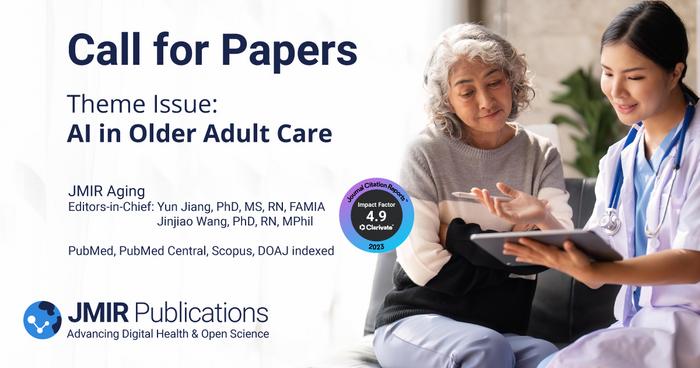Emerging artificial intelligence (AI) technologies, including generative AI models or systems, such as GPT-4, DALL-E 2, and Med-PALM 2, aligned to the medical domain, have the potential to revolutionize the way health care is delivered to older adults. The focus of this call for papers is to explore the potential of AI in the context of aging and the increasingly changing landscape of health care for older adults. We welcome original papers, viewpoints, and literature reviews that explore the concept, uses, effects, and special considerations of AI, particularly generative AI for older adult care.

Credit: JMIR Publications
Emerging artificial intelligence (AI) technologies, including generative AI models or systems, such as GPT-4, DALL-E 2, and Med-PALM 2, aligned to the medical domain, have the potential to revolutionize the way health care is delivered to older adults. The focus of this call for papers is to explore the potential of AI in the context of aging and the increasingly changing landscape of health care for older adults. We welcome original papers, viewpoints, and literature reviews that explore the concept, uses, effects, and special considerations of AI, particularly generative AI for older adult care.
The journal also welcomes submissions on aging-focused big data analytics using data from electronic health record systems, health insurance databases, national administrative databases (e.g. US Medicare and Medicaid), and other large data sets.
We welcome original papers, viewpoints, and literature reviews that explore the concept, uses, effects, and special considerations of AI, particularly generative AI for older adult care.
Submissions are invited on, but not limited to, the following topics:
- Using AI to enhance the care of older adults
- Using AI as a tool to improve the prediction, testing, and diagnosis of age-related diseases by enhancing the quality of medical testing and imaging
- The role of generative AI tools (a category of AI models and tools designed to create new content, such as ChatGPT) in facilitating communication between clinicians and patients
- Development of “point-of-care,” “reminder,” or “documentation” tools using generative AI to improve clinician workflow and reduce clinician burnout
- Limitations and challenges of applying generative AI technologies to age-friendly care for older adults
- Need for data infrastructure, security, and regulations in generative AI applications in the care of older adults
- Future directions of AI-driven, digital healthcare and medical practices for older adults.
We welcome submissions from researchers, educators, and practitioners from around the world. Please visit the JMIR Aging website for more information on submission guidelines and the peer-review process.
JMIR Aging (2023 Impact Factor 4.9) is an open access journal that focuses on digital health, emerging technologies, and health informatics applications for preventative care, clinical care, home care, and self-management support for older adults.
###
About JMIR Publications
JMIR Publications is a leading, born-digital, open access publisher of 30+ academic journals and other innovative scientific communication products that focus on the intersection of health, and technology. Its flagship journal, the Journal of Medical Internet Research, is the leading digital health journal globally in content breadth and visibility, and is the largest journal in the medical informatics field.
To learn more about JMIR Publications, please visit jmirpublications.com or connect with us via Twitter, LinkedIn, YouTube, Facebook, and Instagram.
Head office: 130 Queens Quay East, Unit 1100, Toronto, ON, M5A 0P6 Canada
Media contact: [email protected]



